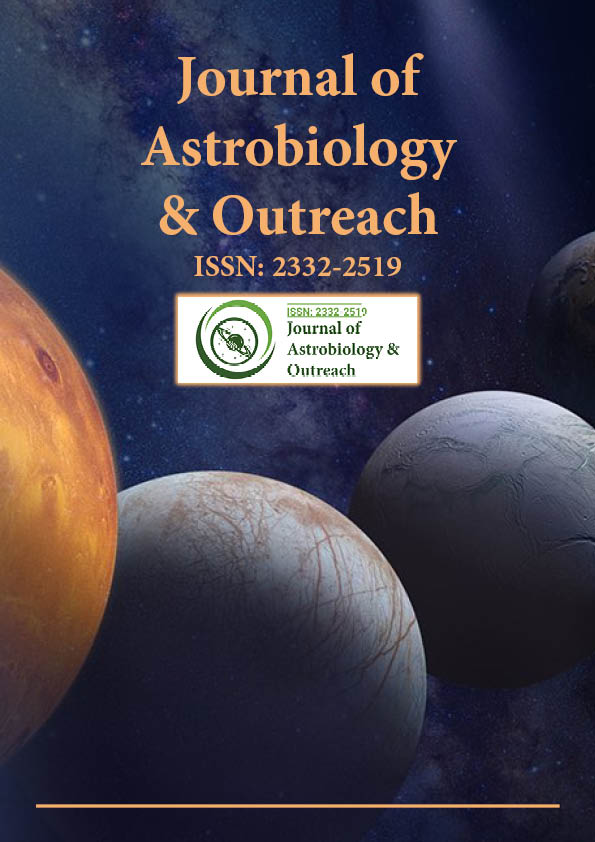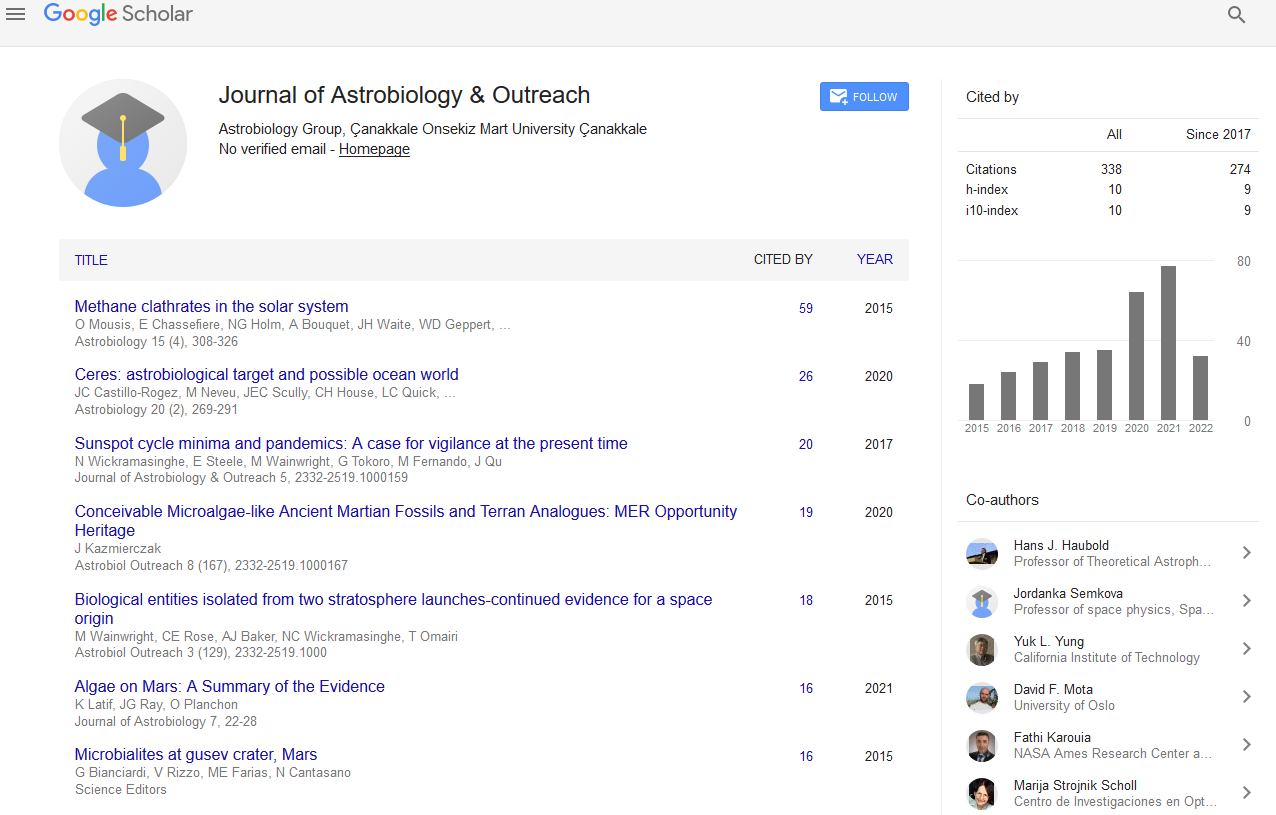Indexed In
- Open J Gate
- Academic Keys
- JournalTOCs
- RefSeek
- Hamdard University
- EBSCO A-Z
- OCLC- WorldCat
- Google Scholar
Useful Links
Share This Page
Journal Flyer

Open Access Journals
- Agri and Aquaculture
- Biochemistry
- Bioinformatics & Systems Biology
- Business & Management
- Chemistry
- Clinical Sciences
- Engineering
- Food & Nutrition
- General Science
- Genetics & Molecular Biology
- Immunology & Microbiology
- Medical Sciences
- Neuroscience & Psychology
- Nursing & Health Care
- Pharmaceutical Sciences
Opinion Article - (2024) Volume 12, Issue 3
Inspecting New Frontiers: Japan's Innovative Path in Space Biology
Hiroshi Yamamoto*Received: 30-Aug-2024, Manuscript No. JAO-24-27915; Editor assigned: 02-Sep-2024, Pre QC No. JAO-24-27915 (PQ); Reviewed: 16-Sep-2024, QC No. JAO-24-27915; Revised: 23-Sep-2024, Manuscript No. JAO-24-27915 (R); Published: 30-Sep-2024, DOI: 10.35248/2332-2519.24.12.356
Description
Japan has been leading the charge in space exploration and its commitment to advancing exobiology through proposed missions utilizing the International Space Station (ISS) represents an exciting frontier in astrobiology. These missions aim to address fundamental questions about the origins and adaptability of life in the universe by utilizing the unique microgravity environment of the ISS. This opinion article explains the significance, potential outcomes and broader implications of Japan’s proposed exobiology initiatives for understanding life’s resilience and its potential existence beyond Earth.
Exobiology, the study of life in extraterrestrial contexts, includes investigations into the biochemical precursors of life, the survivability of organisms in space and the potential habitability of other planets. The ISS offers a controlled platform to simulate aspects of extraterrestrial environments, such as microgravity, radiation exposure and vacuum conditions, making it an ideal setting for exobiology experiments. Japan’s utilization of the ISS for such missions reflects a strategic approach to controlling existing infrastructure to address critical scientific questions.
The significant aspect of Japan’s proposed exobiology missions is the study of chemical evolution. The ISS provides an opportunity to investigate the synthesis of organic molecules, such as amino acids and nucleotides, in a space-like environment. By simulating cosmic conditions, such as ultraviolet radiation and the presence of interstellar ice analogs, these experiments could explore pathways for prebiotic chemistry. Such studies are essential for understanding how the building blocks of life may have formed and been distributed throughout the solar system.
The implications of these missions extend beyond scientific discovery. Japan’s leadership in exobiology highlights the value of international collaboration in advancing space science. As a partner in the ISS program, Japan contributes to a global effort to explore fundamental questions about life in the universe. These missions also demonstrate the importance of combining astrobiology into national space programs, emphasizing its relevance to humanity’s broader search to understand its place in the cosmos.
Moreover, exobiology missions have significant outreach potential, inspiring public interest in space exploration and astrobiology. The prospect of investigating life’s origins and potential existence elsewhere captivates the imagination, making these missions a powerful tool for engaging students, educators and the general public. Through educational initiatives and media coverage, Japan’s exobiology missions could cultivate a deeper appreciation for the interconnectedness of life and the universe.
Despite their potential, these missions face technical and logistical challenges. Conducting experiments on the ISS requires meticulous planning, including the design of strong payloads, coordination with international partners and adherence to planetary protection protocols. Ensuring the authenticity of biological samples and avoiding contamination are critical considerations, particularly for experiments involving potential analogs of extraterrestrial life. Additionally, the interpretation of results must account for the unique conditions of space, distinguishing between intrinsic biological properties and artifacts of the experimental environment.
As Japan moves forward with these proposed exobiology missions, their success will depend on the combination of multidisciplinary expertise, from microbiology and chemistry to space engineering and planetary science. Collaborative efforts with other ISS partners, such as NASA, ESA and Roscosmos, could improve the scientific scope and impact of these missions, promoting a shared commitment to astrobiological research.
In conclusion, Japan’s proposed exobiology missions utilizing the ISS represent a strong and visionary effort to explore the frontiers of life in the universe. By investigating the adaptability of extremophiles and the pathways of chemical evolution in space, these missions address some of the most significant questions in astrobiology. Beyond their scientific contributions, they showcase the power of international collaboration and the potential for space exploration to inspire and unite humanity. As these missions progress, they hold the potential to deepen our understanding of life’s resilience, origins and possible existence beyond Earth, establishing the ISS as a foundational platform for astrobiological discovery.
Citation: Yamamoto H (2024). Inspecting New Frontiers: Japan’s Innovative Path in Space Biology. J Astrobiol Outreach. 12:356.
Copyright: © 2024 Yamamoto H. This is an open-access article distributed under the terms of the Creative Commons Attribution License, which permits unrestricted use, distribution, and reproduction in any medium, provided the original author and source are credited.

